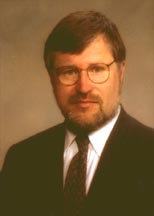It sounds like a storyline for one of the projected new Narnia books: A wizard creates another parallel fantasy world, one that is, in every way, the exact opposite of Narnia. Whereas Narnia is a realm of light, moral order, and Christian symbolism, this new world is grounded in darkness, rebellion, and atheistic symbolism. This new parallel universe grows in popularity and power, whereupon the wizard and his minions launch an attack on Narnia itself.
But this is not a storyline for a new Narnia book; the attack on Narnia is happening in the real world.
Philip Pullman is the author of His Dark Materials, a bestselling fantasy trilogy for children that in sales and popularity ranks just behind the Harry Potter series. This year, the British author won the Whitbread Book of the Year Award for the series finale, The Amber Spyglass, the first time a children's book has ever won England's most prestigious prize for literature.
In a talk sponsored by the London Guardian, Mr. Pullman attacked C.S. Lewis and the Chronicles of Narnia for being "blatantly racist" and "monumentally disparaging to women."
Racist? Surely Narnia, with all of its species of talking animals who get along with each other quite nicely, exhibits a "diversity" commendable even by today's standards.
Disparaging to women? Isn't Lucy the main heroine and the most important point-of-view character? Mr. Pullman, missing the point entirely, said that "one girl was sent to hell because she was getting interested in clothes and boys." This is a reference from The Last Battle to Susan, who stopped believing in Narnia—even though she had been there— when she entered her quest to become popular, fashionable, and thus shallow. She doesn't exactly go to hell, but she is not with her siblings in the train wreck, so she misses out on the new Narnia given to the others.
Surely Lewis's judgment on Susan works against the typical stereotypes of how young women are supposed to act (being all concerned with clothes and boys), lifting up instead as a model the valiant and principled Lucy, always put down by the popular girls at her "modern school."
Mr. Pullman's real objection to Lewis's children's books is that they are "propaganda in the cause of the religion he believed in." That is, that they are Christian.
It is true that Lewis intended his stories to teach children Christianity, although they surely are more than mere "propaganda." The irony is that Mr. Pullman's children's stories really are propaganda for his religion, namely, a militant and slightly mystical atheism.
His Dark Materials is about a cosmic struggle against "the Kingdom of Heaven." Its ruler is an old man with a white beard—described as a doddering, senile sadist—who tries to make everyone conform to his wishes at the threat of eternal punishment. This is Mr. Pullman's portrayal of God. Hypocritical churches enforce His tyrannies on earth.
The children in the novel must join with rebel angels to overthrow this tyrant and to replace this authoritarian hierarchy with a more egalitarian "Republic of Heaven." The storyline unfolds in a labyrinthine plot that is part science fiction and part dark fantasy, seasoned with old-fashioned scientific materialism, libertarian ethics, and esoteric symbolism.
The title is from Paradise Lost, when Satan is flying through chaos in his quest to deceive the human race. Throughout the novels are allusions to Milton. Mr. Pullman belongs to the school of critics—memorably refuted by Lewis in his Introduction to Paradise Lost —that believes Satan is the true hero of Milton's epic. Like some of the gnostic heretics, Mr.Pullman believes that the fall of Adam and Eve was a good thing, a fall from ignorance into knowledge, which then becomes a theme of his trilogy.
The anti-Christian subtext of the series grows from book to book. Readers can easily miss it in the first volume, The Golden Compass. In the second, The Subtle Knife, the caricature of God as a cruel old man becomes explicit. By the third, The Amber Spyglass, characters are openly going beyond the fantasy universe to say things like, "The Christian religion is a very powerful and convincing mistake, that's all."
Mr. Pullman says that he hopes his books will cause more people to read Milton. This seems to be happening, as young people trace his allusions and try to interpret his symbolism. Perhaps the imaginative power of Milton's poem on the fall of Satan and the fall of the human race will counter the imaginative power of Mr. Pullman's allegory. If young people read Paradise Lost—one of Lewis's favorite works, which he drew on heavily for The Chronicles of Narnia —they will learn that Satan, for all his deceptions, turns out to be the real tyrant.
Copyright © 2007 WORLD Magazine, June 22, 2002, Vol. 17, No. 24 Used by Permission.
